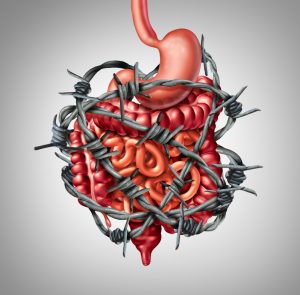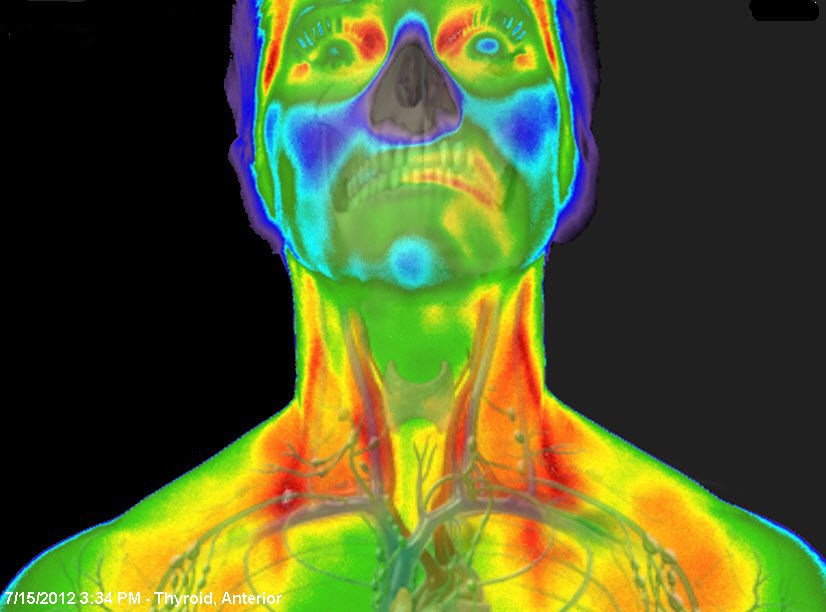Unless you have the sense of humor of a young boy, it’s one of the most difficult things to talk about. For nearly 20% of the adult population, it’s one of the most difficult things to do. We get a little red-faced when asked about it. Sometimes there isn’t enough spray in the world to cover it up and other times, it’s the only thing that could bring relief. It’s a sign you might have eaten something your body doesn’t like, but it also could be a sign something is going terribly wrong. Either way, it needs to be addressed. Yes, you guessed it. It’s time to get candid about your constipation.
What is Constipation?
Constipation is an uncomfortable and inconvenient problem for millions of people. Defined as having difficulty emptying the bowels, bouts are usually associated with hardened feces or dry and small bowel movements that are painful or difficult to pass. When constipation occurs, several things are happening within the GI tract, from the slowed or stopped movement of food waste (stool) passing through the colon to not enough being formed.
Because no two bodies are alike, there is not really one specific number of bowel movements everyone should expect to have daily/weekly. Like all things, bowel movement frequencies vary from person to person. Some people go to the bathroom more than one time daily and others only go every other day. Therefore, to determine if you are constipated, it is important to pay attention to your own habits. If suddenly you are going to the bathroom less frequently than your normal “routine,” you’re likely constipated. *Please note, once per week is not regular and should not be considered your normal routine. If you are going less than three times per week, you might be chronically constipated.

Symptoms
- Stool that is difficult or painful to pass
- Pains in your abdomen and the need to strain or push
- Bloating and often having increased gas
- Low back pain
- Fatigue
- Anxiety
There are many contributing factors to constipation. When sudden symptoms arise, it’s time to think back and take note of what you’ve been ingesting or putting your body through. No matter what the cause, constipation is your body’s reaction and it’s important to listen.
Causes and Factors
- Poor diet: Diets high in processed foods, sugar, refined carbohydrates, alcohol, unhealthy fats, additives, and low in fiber can cause constipation.
- Stress: Stress alters hormone and neurotransmitter production and has a direct impact on inflammation, muscle tension, enzyme production, and overall digestive function.
- Inactivity: Exercise helps control stress. It also increases blood flow and strengthens the muscles within the digestive tract.
- Travel: Many people struggle to use the bathroom in unfamiliar places. From the anxiety that comes with a lack of comfort to the change in diet with foreign foods, many people report bouts of constipation when traveling.
- Opioids: Opioids slow down the central nervous system and the body’s involuntary movements that allow for proper digestion.
- Medications: Some medications cause constipation. Antidepressants, antacids, calcium or iron supplements, anticholinergics, anticonvulsants, narcotics and diuretics are all known to induce bouts of constipation.
- Imbalance in intestinal flora: Probiotics are healthy bacteria living in the gastrointestinal tract and help regulate bowel function. This is why fiber is so important for gut health as “prebiotic” fiber from plant foods helps the probiotic bacteria thrive.
- Thyroid or hormonal problems: PMS, menopause, diabetes, and thyroid disorders like hypothyroidism can all cause constipation. Other diseases that might contribute to constipation include Parkinson’s disease, hypercalcaemia, muscular dystrophy, spinal injuries, and some neurological issues that can affect nerves in the GI tract.
- Magnesium deficiency: Magnesium is an electrolyte that helps with normal muscle functioning. Too little magnesium in your diet can contribute to muscle tension and also worsen symptoms of emotional stress.
- Bad bathroom habits: For some, rushing the time they spend in the bathroom can contribute to bowel movements that don’t feel complete. Ignoring the feeling or urge all together out of fear of going in a public area or out of your own comfort zone can also contribute to blockage.
- Poor sleep: Not getting enough sleep can throw off your digestive regularity.
- Age: Sometimes older adults lose interest in food, which means they stop consuming enough fiber and calories, and therefore digestion slows down.
- Irritable bowel syndrome (IBS): Abnormal digestive function is often attributed to digestive disorders including IBS, which can cause continuous constipation as one of its many symptoms.
Diet
The most important action you can take to get things moving regularly is to address your diet—the number one culprit for constipation. A diet that is high in processed foods and sugars can do great harm and constipation is your body’s way of telling you it’s in trouble. Pay attention!
Foods that Make it WORSE
- Unhealthy foods that have high amounts of calories, but very little fiber or nutrients, should be eliminated. Unfortunately, these can include foods reported to be very common in the Standard American Diet such as: processed cheese, sugary cereals, chips, fast food, ice cream, processed meats and high sodium frozen foods.
- Fried Foods have trans-fats (usually found in fried foods, fast food, and fatty packaged products) and slow movement through the intestines, slowing or stopping digestion.
- Alcohol increases urine production and causes dehydration, which is difficult on the digestive system.
- Dairy products: Many people are lactose intolerant and can become constipated by simply consuming dairy products.
- Refined flour: Refined flour does not contain any fiber and, therefore, will not help with constipation.
Foods to Make Things Move
- Healthy fats: Your digestive system and other organs need some fat to function properly. Foods like wild fatty fish (sardines, white fish, salmon, etc.), olive oil (which smoothes the insides of the bowels) and avocados are a great way to get your body working regularly again.
- High fiber foods: Soluble fiber allows more water to remain in your stool, making waste softer, larger, and therefore, easier to pass through the intestines. Insoluble fiber adds bulk to fecal material, which speeds up its passage through the gut and prevents that constipated feeling. Foods high in fiber include oatmeal, berries, beans, nuts, prunes, pears, figs, flax seeds, and green vegetables.
- Tea: It’s a great way to ensure hydration, which is key to bowel regularity. Aside from its great antioxidant benefits, the natural caffeine content of green tea may result in a mild laxative. Mint tea contains menthol, which relaxes the muscles of the digestive tract. Ginger tea is a “warming” herb that causes the inside of the body to generate more heat, which can aid in sluggish digestion.
- Water & hydrating liquids: Fiber needs water to pass through the digestive system and form stool. Water is normally withdrawn from the colon, which can make stools difficult to pass. Drinking enough water ensures that things will move along easily. You should be drinking at least 6-8 glasses of water per day. Tip: Squeeze in a lemon! The citric acid in lemon juice acts as a stimulant to the digestive system and can help flush toxins from the body, providing constipation relief.
More Tricks to Release
- Probiotics help maintain a healthy intestinal tract, which is critical for avoiding digestive problems.
- One of the best “laxatives” is MCT oil. You can put it in your coffee or use it in your smoothies and salad dressings. If you’re new to MCT oil, start in small amounts first like a half teaspoon and then increase every day to an amount you can tolerate.
- Vitamin C is another great aid as the vitamin increases gastric motility or speeds up the digestive process. Beware: Too much vitamin C can have side effects. It’s best to consult with your practitioner when increasing dosages.
- Magnesium for constipation works by improving gut motility.
- Exercise is a great laxative, so move your body every day to move those bowels.
Long-Term Complications
For most people constipation rarely causes complications, but people with long-term constipation can develop:
- Hemorrhoids, which are swollen veins in the lowest part of your rectum and anus
- Fecal impaction, where dry, hard stools collect in the rectum
- Bowel incontinence or the leakage of liquid stools
Do not let it get to that point! It’s embarrassing and awkward, but when it does not go away it’s time to get proactive about your health and reach out to a Functional Medicine Practitioner.
When to Seek Help
Constipation can usually be managed without the need for a doctor visit, laxatives or prescriptions. In some cases, there could be underlying issues such as anal fissures, bowel instructions or strictures, colon cancer, rectal cancer, or even some kind of abdominal cancer pressing on the colon. When your constipation isn’t going away, it’s time to really pay attention to the tell-tale signs something serious is happening:
- Constipation that becomes severe and lasts for more than 3 weeks
- Constipation accompanied by diarrhea and signs of malnutrition
- Blood in your stool, a bulging abdomen or signs of an enlarged spleen
- Intense and/or constant abdominal pain
- Vomiting
Final Thoughts
Whether you ingested something bad or have an untreated underlying issue, constipation is your body’s way of telling you it might be in trouble. Relief is possible! Constipation can usually be managed on your own, but in some cases it is best to seek guidance from an expert. With the help from our Functional Medicine Nutritionists at Forum Health Clarkston, you can finally get to the bottom of your constipation. To find out more about our unique, proven process, sign up for one of our FREE Meet and Greets!
Adrian Schirr
Forum Health Clarkston
248-625-5143
References:
Dr. Axe, “Natural Constipation Relief Remedies: Foods, Supplements + Practices,” Dr. Axe.
Dr. Mark Hyman, “Simple Steps for Dealing with Constipation,” Dr. Hyman.
Silberman, Leah, “Constipated? Add These 10 Foods To Your Diet For The Perfect Poop,” MBGHealth.








